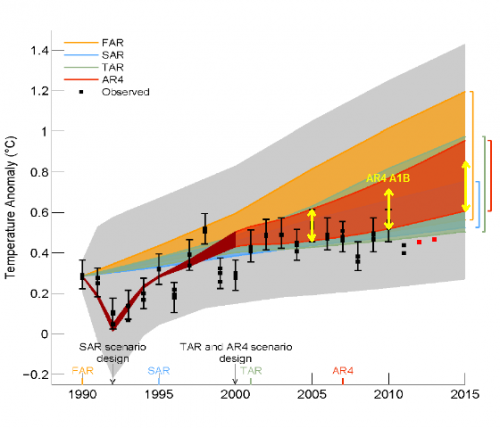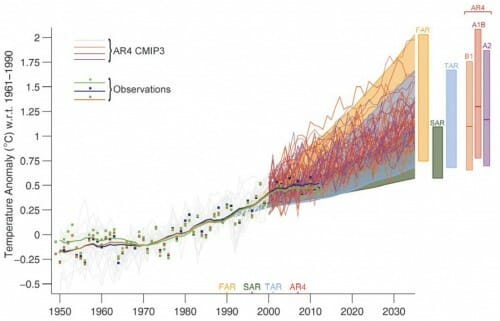Climate Humor from the New York Times
Though this is hilarious, I am pretty sure Thomas Lovejoy is serious when he writes
But the complete candor and transparency of the [IPCC] panel’s findings should be recognized and applauded. This is science sticking with the facts. It does not mean that global warming is not a problem; indeed it is a really big problem.
This is a howler. Two quick examples. First, every past IPCC report summary has had estimates for climate sensitivity, ie the amount of temperature increase they expect for a doubling of CO2 levels. Coming into this IPCC report, emerging evidence from recent studies has been that the climate sensitivity is much lower than previous estimates. So what did the "transparent" IPCC do? They, for the first time, just left out the estimate rather than be forced to publish one that was lower than the last report.
The second example relates to the fact that temperatures have been flat over the last 15-17 years and as a result, every single climate model has overestimated temperatures. By a lot. In a draft version, the IPCC created this chart (the red dots were added by Steve McIntyre after the chart was made as the new data came in).
This chart was consistent with a number of peer-reviewed studies that assessed the performance of climate models. Well, this chart was a little too much "candor" for the transparent IPCC, so they replaced it with this chart in the final draft:
What a mess! They have made the area we want to look at between 1990 and the present really tiny, and then they have somehow shifted the forecast envelopes down on several of the past reports so that suddenly current measurements are within the bands. They also hide the bottom of the fourth assessment band (orange FAR) so you can't see that observations are out of the envelope of the last report. No one so far can figure out how they got the numbers in this chart, and it does not match any peer-reviewed work. Steve McIntyre is trying to figure it out.
OK, so now that we are on the subject of climate models, here is the second hilarious thing Lovejoy said:
Does the leveling-off of temperatures mean that the climate models used to track them are seriously flawed? Not really. It is important to remember that models are used so that we can understand where the Earth system is headed.
Does this make any sense at all? Try it in a different context: The Fed said the fact that their economic models failed to predict what actually happened over the last 15 years is irrelevant because the models are only used to see where the economy is headed.
The consistent theme of this report is declining certainty and declining chances of catastrophe, two facts that the IPCC works as hard as possible to obfuscate but which still come out pretty clearly as one reads the report.


“It is important to remember that models are used so that we
can understand where the Earth system is headed.”
Total bullshit.
If you used that standard for financial (and probably most other predictive) models, you’d get fired instantly.
They work, or they don’t.
These models are garbage.
The Fed is in fact getting blasted for that very thing –
http://www.zerohedge.com/news/2013-10-02/quote-day-fed-forecasts-vs-reality-edition
Fed forecasting has been outstandingly shitty over the past 5 years.
Given all the variables, and the degree of precision in the data, how are we to conclude increasing CO2 levels by fifty or even a hundred parts per million has had a measurable effect? This is not a smartass question.
They should have trained their computers on explaining the Keynesean multiplier, which creates wealth out of thin air, and then blamed 100 ppm of CO2 for the failure of socialism. At least the result is predictable. More hair of the dog.
Mesaeconguy,
You said it!
In all humility, having read countless research reports from brokerage firms, written by a tyro who has the latest edition of excel, I have mistrusted almost everything they say.
In another career, I was advised to believe nothing I heard and only half of what I saw, and as soon as I learned that lesson, I was able to find success. The corollary to that principle is not to take yourself so seriously, too.
One time, the founder of the company I ran, who was learned and precise in using English, was presented in a meeting by a Vice President with nonsense, and he said, "There is only one word for that, and that's bullshit."
I thought models were hypothesis, not fact. When did scientists decide that they were facts, not hypotheses?
Sigh. "Global warming" is just another case like "Iraq's WMDs". It's a FUD (Fear/uncertainty/doubt) argument that sounds good enough to maybe be true with substantially inflatable dire consequences that will sell well to the political audience one is pondering to. And, voila: money flows, income is generated and the authors can leverage power. It's sometimes sad to see the same political gimmicks that worked real well for the tribe's Shaman 10k years ago play out without much alteration today.
They lie like rugs. Really UGLY rugs.
LOL, Keynes would froth at the stimulus/reconstructive/reorg programs available due to "global warming." He could make billions.....
http://www.youtube.com/watch?v=32C0eKRQVt8
These are very strange climate models that can't be correlated with the known past but which have predictive power for the unknown future.
It's atmospheric temperatures that have leveled off; ocean temperatures have continued to increase. It's true that no one is sure why, and that there have been major embarrassments to its adherents like "Climategate" (I hate the general habit of appending -gate to every scandal, but until we get something better I'll do it), but on the whole, I think being concerned and cautious about it is far better than to dismiss it. Far better to assume something worse than we hope and act accordingly. If it's not happening, or not happening as badly as we thought, joy, we got a bonus. If it is, or it's worse, we got D'd up in time. Wishful thinking is one of the worst faults of the Democrats about economic matters; it's just as bad an idea for people to indulge in it about the climate.